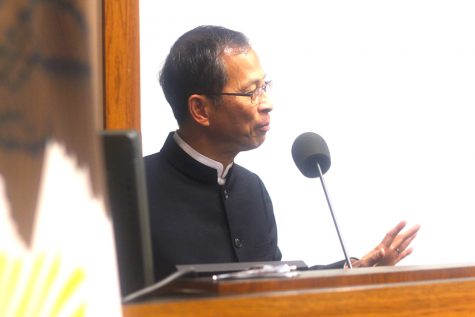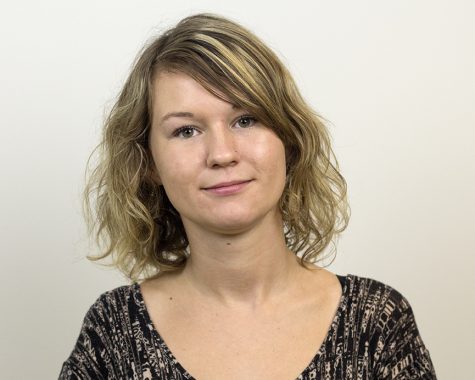Hong Kong leader talks about past tensions with communist China
September 22, 2016

Jasper Tsang Yok-Sing, Speaker of the Hong Kong Parliment, discusses the two party system in Hong Kong, which consists of The Hong Kong Speical Administrative Region and The Mainland in China, on wednesday night in Roberson auditorium in Lumpkin Hall.
Jasper Tsang Yok-sing, president of the Legislative Council of Hong Kong, talked about the history of Hong Kong and its new democratic practices Wednesday night in the Roberson Auditorium in Lumpkin Hall.
Tsang spoke about the Joint Declaration, where the United Kingdom turned their control of Hong Kong over to China.
He said many people left the city because of the signing of the declaration, as they wondered how Hong Kong would stay the same and keep its integrity after being absorbed into China.
Tsang contrasted Hong Kong and China by pointing out how Hong Kong has the freest economy in the world, being capitalist, while China is run by a communist party.
Tsang said there ended up being an overhaul in Hong Kong politics to make the governor and all legislators able to vote.
Whenever relations get tense between Taiwan and China, Hong Kong is the middleman, Tsang said.
“When people from Taiwan wanted to go to the mainland, they came through Hong Kong and vice versa,” Tsang said.
Tsang said Hong Kong has seen many political crises take place since the return of Hong Kong to China, which has made having good relations between the two areas harder.
One example Tsang gave of this was an education law.
Chinese high school students protested against national education, which were full of lessons in patriotism and familiarizing the students with the country.
He said as a result of these protests, the Hong Kong government had to get rid of the education program, which upset the Chinese government.
Another example Tsang cited was when a protest started over a change in how elections would be conducted.
After his lecture, Tsang answered questions from the audience about a variety of topics including North Korea.
He said he is not worried about North Korea getting closer to China or their alleged nuclear arsenal.
“No one in his right mind can understand what is happening,” Tsang said.
Josh Bost, a sophomore sociology major, said he heard about Tsang’s address through both a political science professor and the Student Senate.
Bost said he has always been curious about Hong Kong and thought this would be a good way to learn more about it.
He said he was surprised someone from there was on campus.
“He gave us a good history lesson,” Bost said.
He said the aspect of the speech which stuck with him most was how the Hong Kong government listened to the young people and how they took their complaints seriously.
Richard England, dean of the Honors College, said he thought hearing about Chinese politics firsthand would be a good way to learn about it.
“I did not hear about any other world leaders in Charleston, so I figured ‘What the heck, this is my guy,’” England said.
England said he liked how Tsang was able to balance the interests of multiple parties in difficult political situations.
Tsang said he appreciated how many people are interested in Hong Kong and appreciated seeing his city’s flag in an auditorium at Eastern, all the way in central Illinois.
Samuel Nusbaum can be reached at 581-2821 or at [email protected].














































